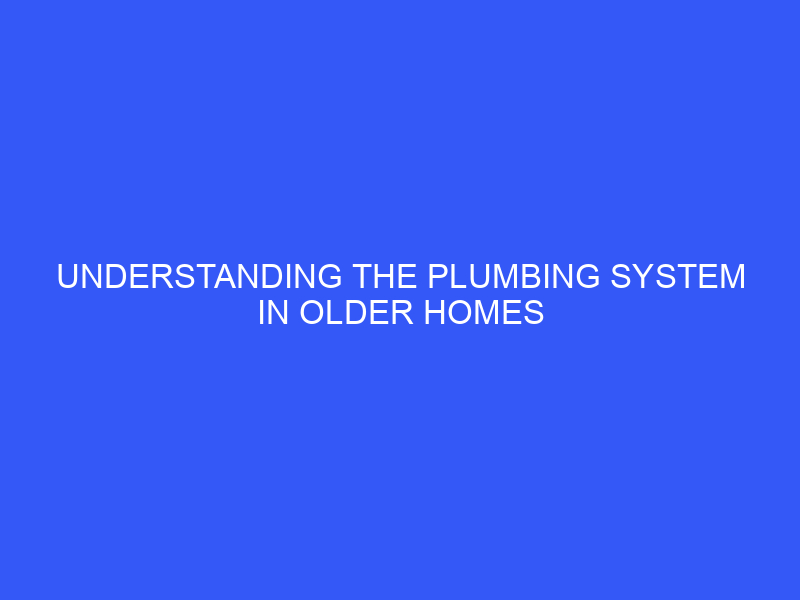Plumbing renovations in older homes can take a lot of work to complete. Homeowners and real estate investors must comprehend the important factors to consider when repairing. By considering these elements, you can ensure that the plumbing system in your older home is effectively renovated to satisfy contemporary requirements.
Important Factors To Consider When Renovating Plumbing In Older Homes
In this post, we’ll review some crucial factors while remodelling older homes’ plumbing, giving you insightful guidance.
The Importance of Plumbing Renovation
In older homes, plumbing remodelling is essential for several reasons:
- Improved functionality: By keeping the plumbing system up to date, the property can avoid problems like leaks, poor water pressure, and drainage concerns.
- Increased Efficiency: Renovated plumbing systems frequently increase energy and water flow, saving you money on utilities.
- Enhanced Property Value: Your property will appeal more to prospective tenants or buyers with a contemporary, well-maintained plumbing system.
Given the importance of plumbing remodelling, it is imperative to understand certain critical elements before beginning the job.
Assess the Existing Plumbing System
Perform a comprehensive evaluation of the current plumbing system in your older property before beginning any plumbing renovation projects:
- Pipe Material and Condition: Find out what kind of pipes are currently in use in the system and evaluate their state. Lead, iron, and galvanized steel are common elements found in older homes; however, these materials may need to be replaced because of their vulnerability to leaks and corrosion.
- Water Pressure: Verify the property’s overall water pressure. Low water pressure may indicate more serious problems, such as broken or clogged pipes.
- Drainage Framework: Examine the drainage system for indications of obstructions or uneven terrain. Renovations to the plumbing system offer a chance to deal with these problems and remove wastewater effectively.
Knowing the state of your current plumbing system will help you estimate the amount of renovation needed and foresee any problems.
Compliance with Building Codes and Regulations
Ensuring the plumbing renovations in older houses adhere to the latest building norms and regulations is essential.
- Permits: To find out if tickets are needed for plumbing renovations, check with the local government. Inaction may result in expensive fines and delays.
- Water Conservation: To help you conserve water and go by environmental requirements, think about installing fixtures and appliances that meet water efficiency standards.
- Accessibility: If you intend to sell or rent the property, ensure the plumbing system complies with accessibility guidelines.
Following building codes and regulations guarantees that your property is up to code and safeguards the tenants’ health and safety.
Hire a Professional Plumbing Contractor
It is strongly advised to work with a licensed plumbing contractor when renovating older houses’ plumbing:
- Experience and Expertise: A qualified plumber is equipped with the know-how to tackle the particular difficulties that can arise while renovating.
- High-quality artistry: By guaranteeing that the renovation is completed to a high degree, a skilled plumber will reduce the likelihood of further plumbing problems.
- Time and Cost Efficiency: By preventing expensive errors and guaranteeing the project is finished within the allotted time, hiring an expert will save you both time and money.
Remember to do your homework and choose a reliable, licensed plumber for your project.
In Conclusion
Plumbing renovations in older homes are a work that needs to be planned and executed with great care. By evaluating the current plumbing system, adhering to building regulations, and employing a qualified contractor, you can accomplish a prosperous remodel that amplifies your home’s usefulness, economy, and general worth. It will be beneficial for you as the owner to invest in these upgrades, and it will also draw in prospective tenants or buyers.
Tips for Maintaining Plumbing in Older Houses
But you can keep your plumbing system in excellent condition and save money on repairs by giving it the attention and maintenance it needs. This post will review some crucial advice for preserving older homes’ plumbing.
Regularly Inspect the Pipes
Examining your older home’s plumbing system in-depth should be one of your priorities. Keep an eye out for any damage, corrosion, or leaks. Particular attention should be paid to any exposed pipes in the crawl or basement areas. To stop additional damage, you must take immediate action if you see any problems, such as rust or cracks. Consider contacting a licensed plumber to help you with the inspection and offer knowledgeable counsel.
Upgrade Outdated Fixtures
Older homes frequently feature fixtures that need to be more in style and utilize less water efficiently. Therefore, replacing your old fixtures with low-flow, more recent types will reduce water usage and preserve the environment. Seek out institutions bearing the WaterSense certification, signifying their compliance with the water-efficiency and performance standards set by the Environmental Protection Agency. Modern toilets, showerheads, and faucets can be swapped out for more aesthetically pleasing and water-efficient models.
Keep Drains Clear and Flowing
In older homes, clogged drains can be a constant problem. Use drain traps or screens to capture food particles, hair, and other debris before they enter the plumbing system to avoid blockages. To keep these screens or traps working properly, clean them regularly. Grease, oil, and coffee grounds can solidify and cause blockages in the drain, so avoid dumping them down there. It’s also a good idea to occasionally use a safe drain cleaning to keep your drains operating smoothly. Be careful and follow the directions, as certain harsh chemicals might harm older pipes.
Insulate Exposed Pipes
It’s critical to adequately insulate exposed pipes in your older home in colder, non-heated spaces like the attic or basement. Insulation keeps lines from freezing in the winter, which reduces the risk of burst pipes and significant water damage. Insulating your pipes is an affordable and easy way to save major headaches.
Monitor Water Pressure
Your plumbing system may need to be fixed, leading to leaks and pipe damage. Utilize a pressure gauge to gauge the water strain in your home. The ideal reach is usually between 40 and 80 psi (pounds per square inch). Installing a pressure regulator could be necessary if the pressure rises above this range to shield your fixtures and pipes from potential damage.
Schedule Professional Inspections
It’s crucial to periodically have a licensed plumber evaluate the plumbing system in an older home, even with routine maintenance. A professional can find hidden problems, perform expert-level maintenance duties, and ensure everything operates at peak efficiency. Additionally, they can offer suggestions for improvements or fixes that will lengthen the life and improve the performance of your plumbing system.
Key Takeaways
- Make routine checks for damage, corrosion, and leaks in your plumbing system.
- Replace old, inefficient fixtures with new, water-saving models.
- Use screens and traps to keep drains free and clear, and refrain from spilling hazardous materials down the drain.
- During the winter, insulate exposed pipes to avoid freezing.
- Keep an eye on the water pressure to prevent overstressing fixtures and pipes.
- Arrange for expert inspections to find hidden problems and get guidance from professionals.
Using this advice, you can take care of your older home’s plumbing system and avoid serious issues. Following these tips, you can keep up with your older house’s plumbing system and avoid significant plumbing nightmares.
Proactive maintenance will save you time and cash and guarantee your home’s solace and usefulness. Remember, a very much-kept-plumbing system is pivotal for a cheerful, tranquil living experience.
Upgrading the Plumbing System in an Older Home
This is the point at which plumbing system upgrades become essential. In this piece, we’ll look at the advantages of modernizing the plumbing system in your older house, review the main procedures, and offer helpful advice on what to look for and think about.
Why Upgrade the Plumbing System?
- Dependable Performance: Investing in plumbing system upgrades guarantees steady, reliable water flow throughout your house. It eliminates the hassle of constantly dealing with leaks, clogs, or busted pipes.
- Increased Water Efficiency: Outdated fixtures and appliances in older homes can use more water. Replace your old, inefficient showerhead, toilet, and faucets with new ones to drastically reduce water use and help the environment.
- Enhanced Property Value: A contemporary, well-kept plumbing system adds significant value to a home. Potential buyers are more likely to prefer an older property with an updated plumbing system than one needing emergency repairs.
- Safety and Health: An outdated plumbing system risks contamination due to corroded or rusted pipes. By replacing your plumbing system, you may be sure your water is pure, safe to drink, and free of harmful germs.
The Upgrading Process
- Evaluation: Evaluate your existing plumbing system and determine which parts need fixing immediately. Inspect for indications of water damage, leaks, or corroded pipes. This will assist you in setting priorities for the upgrades and allocating funds appropriately.
- Plan and Budget: To develop a thorough plan for updating your plumbing system, speak with a licensed plumber. Consider things like how old your house is, how many fixtures need to be replaced, and any other requirements like installing a new water heater or water filtration system. To guarantee a seamless upgrade procedure, establish a reasonable budget.
- Fixture Replacement: Swap out old, inefficient fixtures for more contemporary, water-efficient ones. To save water, install low-flow showerheads, toilets, and faucets. Your plumbing system will function more efficiently, and you will eventually pay less for water.
- Pipe Replacement: Lead or galvanized iron pipes, which can be dangerous and prone to corrosion, are sometimes found in older homes. Consider replacing these pipes with more durable and safe copper or PVC pipes. As a result, your plumbing system will function more effectively and endure longer.
Considerations for Upgrading
- Local Building Standards: Verify that your plumbing upgrades abide by the most recent standards and regulations by contacting your local building department. You’ll be able to avoid any future legal issues by doing so.
- Employ a Professional: Although you may be tempted to tackle plumbing upgrades independently, hiring a professional plumber is best. They can finish the upgrades quickly and safely since they have the necessary skills, equipment, and knowledge.
- Planned Downtime: You may need to temporarily turn off the water supply while upgrading your plumbing system. To reduce annoyance throughout the upgrade procedure, schedule beforehand and work with your plumber.
In Conclusion
To improve your home’s overall value and functioning, upgrading the plumbing system in an older house is a prudent investment. You can enjoy your house with peace of mind by taking care of possible problems, increasing water efficiency, and guaranteeing the security and purity of your water supply.
To get the most out of your plumbing system improvement, work with a licensed plumber, carefully plan your modifications, and follow local codes. Don’t allow your home’s history to prevent you from enjoying contemporary luxuries.


